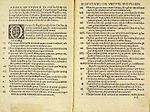This article by the late Billy Mitchell first appeared in Lion and Lamb in 2002.
|
|
||
|
SCAPEGOATING – THE ANCIENT ART OF SHIFTING BLAME In Old Testament times the itinerant Hebrew nation had a novel way of cleansing itself of any guilt arising from social sins. The religious leaders laid hands on a goat and ceremoniously transferred the guilt of the people to the goat, which was then driven outside the camp of Israel into the wilderness. From this ancient ritual we have developed the practice of scapegoating. Secondly, it is an exercise in social exclusion and marginalisation. Just as the scapegoat was driven outside the camp into the wilderness so we attempt to drive our scapegoats outside the parameters of respectable society into the margins of a supposed mafia sub-culture. We demonise, vilify and marginalise others so that we can enjoy the smug satisfaction of our own self-righteousness. We fail to recognise that members of paramilitary organisations are members of our own communities – that they are husbands and sons, brothers and fathers. They are not animals like the Hebrew scapegoat, they are flesh of our flesh and bone of our bone. Scapegoating saves the media from having to investigate the true origins and nature of society’s ills. It is a lot easier to lay the blame on a ready-made scapegoat than having to look for real identifiable culprits. Blaming unincorporated organisations which have no legal remedy against slander and libel is a lot safer than naming individuals and having to face them in court. Politicians use the paramilitaries as scapegoats to cover up their abject failure to establish a just, equitable and peaceful society in which all citizens can enjoy a life free from crime and deviant behaviour. The clergy use the paramilitaries as scapegoats to cover up their failure to build a bridge between a world of hurting humanity and the love and compassion of a healing Saviour. Locked away in their holy huddles and spiritual bunkers they have lost the significance of incarnational theology and forgotten the true meaning of kenosis. In the wake of recent events within loyalism some of these clergy have emerged from their cloistered hide-aways to present themselves as potential mediators. How people can present themselves as credible and impartial mediators, while still engaging in the prejudicial art of scapegoating the very people between whom they wish to mediate, is beyond my understanding. Whatever the faults of paramilitarism may be – and there are many – they ought not to be used as the scapegoats for society’s ills or as a cover for the failure of civil society to address its own problems. Billy Mitchell was a member of the Progressive Unionist Party Executive and Programme Manager of LINC resource Centre, an inter-community development initiative based in North Belfast. |
||






